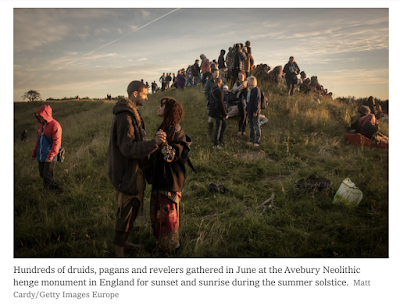Is the West Becoming Pagan Again?
Is the West Becoming Pagan Again?
Excerpt:
Many Americans have a sense that their country is less religious than it used to be. But is it really? The interplay among institutions, behaviors and beliefs is notoriously hard to chart. Even if we could determine that religious sentiment was in flux, it would be hard to say whether we were talking about this year’s fad or this century’s trend.
Or perhaps we are dealing with an even deeper process. That is the argument of a much-discussed book published in Paris this fall. In it, the French political theorist Chantal Delsol contends that we are living through the end of Christian civilization — a civilization that began (roughly) with the Roman rout of pagan holdouts in the late fourth century and ended (roughly) with Pope John XXIII’s embrace of religious pluralism and the West’s legalization of abortion.
The book is called “La Fin de la Chrétienté,” which might be translated as “The End of the Christian World.” Ms. Delsol is quite clear that what is ending is not the Christian faith, with its rites and dogmas, but only Christian culture — the way Christian societies are governed and the art, philosophy and lore that have arisen under Christianity’s influence. ...
Ms. Delsol’s ingenious approach is to examine the civilizational change underway in light of that last one 1,600 years ago. Christians brought what she calls a “normative inversion” to pagan Rome. That is, they prized much that the Romans held in contempt and condemned much that the Romans prized, particularly in matters related to sex and family. Today the Christian overlay on Western cultural life is being removed, revealing a lot of pagan urges that it covered up.
To state Ms. Delsol’s argument crudely, what is happening today is an undoing, but it is also a redoing. We are inverting the normative inversion. We are repaganizing.
Paganism never had a precise definition. The word was a catchall for those who rejected the Christian revelation, whether polytheists, nature-worshippers or agnostics. The pagus was the countryside. The Latin word “paganus,” like the English word “heathen,” carried with it a contempt for the hick and the hillbilly.
... So if another civilization comes to replace Christianity, it will not be a mere negation, such as atheism or nihilism. It will be a rival civilization with its own logic — or at least its own style of moralizing. It may resemble the present-day iconoclasm that French commentators refer to as le woke. (The term means basically what it does in English, except that French people see wokeness as a system imported wholesale from American universities and thus itself almost a religious doctrine.)
Christianity the religion has teachings about loving one’s neighbor and turning the other cheek that are impressively clear. For Christianity the culture, though, these can be sources of ambivalence. Christianity has produced some hardened moralizers, to put it mildly. But there has always been a tension between its teachings and its quest for political power.
Ms. Delsol worries that le woke has no such hesitation. Speech codes, elementary school consciousness-raising, corporate public service advertising — in some ways our public order is coming to resemble that of pagan Rome, where religion and morality were separated. Religion was a matter for the household. Morality was determined and imposed by society’s elites, with grim results for freedom of thought.
Comment: Image source from NYTimes "The Return of Paganism"


No comments:
Post a Comment
Any anonymous comments with links will be rejected. Please do not comment off-topic